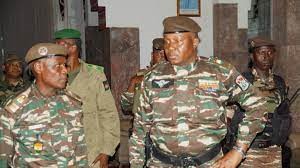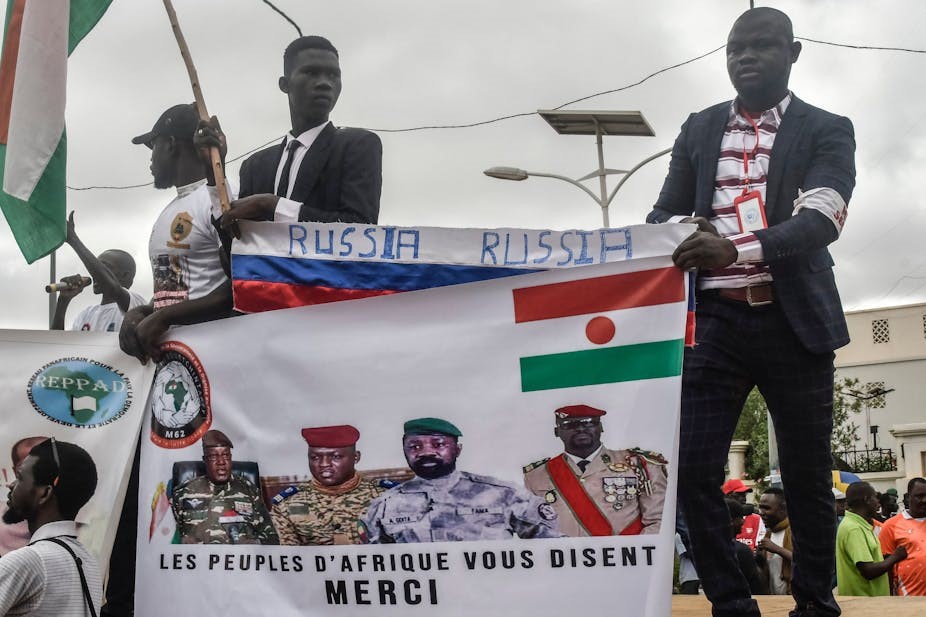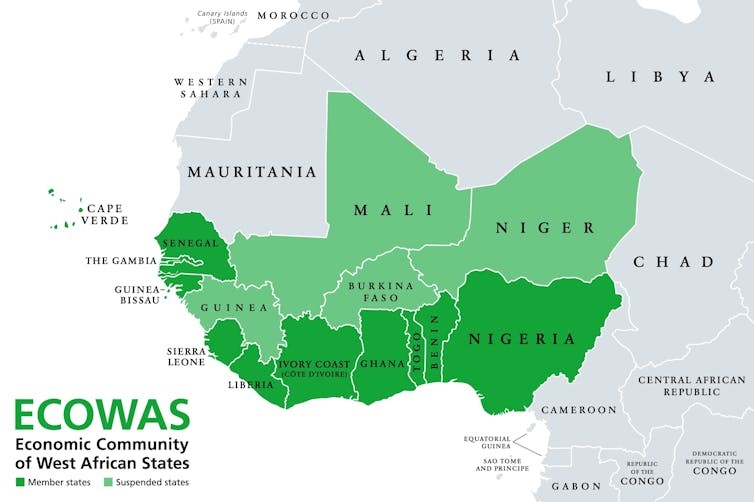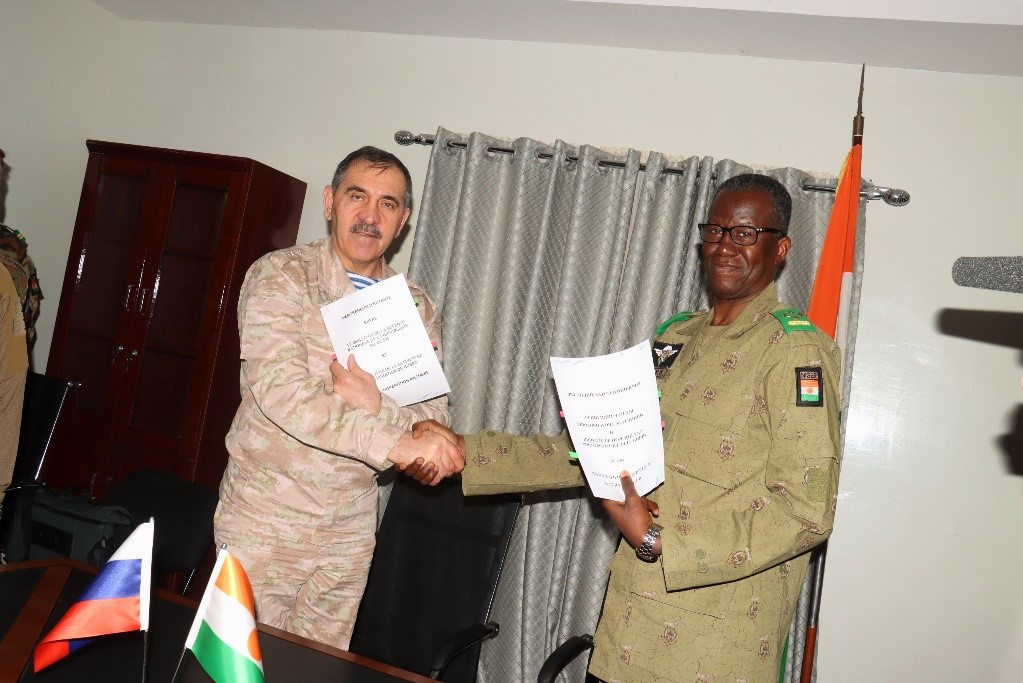Andrew McGregor
Eurasia Daily Monitor 21 (56), April 11, 2024
Jamestown Foundation, Washington DC
Executive Summary
- Russia is actively expanding ties with Niger’s military junta to consolidate control over resource-rich assets and to push out Western influence.
- Moscow has now signed multiple agreements to provide security guarantees to Abdourahamane Tchiani and potentially take over the rights to several Nigerien gold mines.
- Kremlin propaganda relies on “anti-colonial” narratives that have played a role in pushing the French and US military presence out of the country.
Nigerien president Mohamed Bazoum was overthrown by his own Garde Présidentielle on July 26, 2023. The Army backed the coup a day later, enabling former Garde leader Brigadier General Abdourahamane Tchiani to proclaim himself Niger’s new head-of-state. Bazoum was detained and coup supporters flooded the streets of the capital, Niamey, many of them waving Russian flags. The display raised suspicions of Russian/Wagner involvement in the coup.
 Brigadier General Abdourahamane Tchiani (Reuters)
Brigadier General Abdourahamane Tchiani (Reuters)
President Bazoum was known for his support of Ukraine at the UN and joined a diplomatic initiative to return rule of Crimea to Ukraine, though there were other factors at work in the coup besides pro-Russian sentiment in the military, including Bazoum’s Arab ethnicity in a Hausa-majority country (Arabs form less than 1% of the population) (AfricaNews, February 19, 2021). A stagnant economy, growing insecurity and the presence of Western troops were other factors, but the spark for the coup appears to have been Bazoum’s intention to shake up the ineffective military leadership. Like many other regional coup leaders, General Tchiani (a Hausa) and his armed forces chief-of-staff General Moussa Salaou Barmou received American military training.
Ukraine insisted Russia was behind the coup as part of its “scenario for provoking instability to undermine the global security order” (Anadolu Agency, August 1, 2023). Perhaps putting a damper on the idea that Russia had orchestrated the coup was Russian foreign minister Sergei Lavrov’s initial condemnation of the putsch as “an anti-constitutional undertaking” (Vedomosti, January 17).
 Protesters in Niger’s capital Niamey hold a Russian flag and banner with images of coup leaders in Niger, Burkina Faso, Mali and Guinea (AFP)
Protesters in Niger’s capital Niamey hold a Russian flag and banner with images of coup leaders in Niger, Burkina Faso, Mali and Guinea (AFP)
Moscow nonetheless came to the defense of the junta when the Economic Community of West African States (ECOWAS) indicated it was planning a military intervention to restore President Bazoum (BBC, August 11, 2023). The military dictatorships of Mali, Burkina Faso and Guinea (all ECOWAS members) signalled their intent to oppose any ECOWAS action against Niger and its new rulers, the Conseil Supérieur pour la Sauvegarde de la Patrie (CNSP – National Council for the Safeguarding of the Homeland).
 With 1500 French troops in Niger, the French military was the junta’s first target with the cancellation on August 3, 2023 of all five military cooperation agreements with France (signed between 1977 and 2020). The French force was assisting in the struggle against Islamic State militants and jihadists of al-Qaeda-related Jama’at Nusrat al-Islam wa’l-Muslimeen (JNIM) but was no longer having the impact it once did, providing fertile ground for anti-French Russian media manipulation. As ordered by the junta, French troops began evacuating Niger on October 10 (RIA Novosti, October 10, 2023). The last French troops left on December 22. Several weeks after their departure, Niger Defense Minister General Salifu Modi said the evacuations had already provided a “positive impact on our fight against terrorism” (RIA Novosti, January 17).
With 1500 French troops in Niger, the French military was the junta’s first target with the cancellation on August 3, 2023 of all five military cooperation agreements with France (signed between 1977 and 2020). The French force was assisting in the struggle against Islamic State militants and jihadists of al-Qaeda-related Jama’at Nusrat al-Islam wa’l-Muslimeen (JNIM) but was no longer having the impact it once did, providing fertile ground for anti-French Russian media manipulation. As ordered by the junta, French troops began evacuating Niger on October 10 (RIA Novosti, October 10, 2023). The last French troops left on December 22. Several weeks after their departure, Niger Defense Minister General Salifu Modi said the evacuations had already provided a “positive impact on our fight against terrorism” (RIA Novosti, January 17).
There were initial concerns that the coup in Niger might interrupt the flow of uranium to French nuclear reactors, but these concerns appear to have been overstated. Shortly after the coup, France’s Ministry of Energy Transition insisted: “The situation in Niger does not present any risk to France’s security of supply of natural uranium” (TV5Monde/AFP, July 31, 2023).. Niger is one of France’s top three uranium suppliers, supplying 20% of French needs (TV5Monde/AFP, July 31, 2023). France maintains a strategic stockpile of strategic uranium equal to a two-year supply and is actively seeking to diversify its supply, including a long-term deal with Mongolia in October 2023 and the construction of a uranium recycling plant (Portail de l’IE [Paris], January 9; La Tribune [Paris], January 9).
A speaker believed to be Wagner chief Yevgeny Prigozhin used a Wagner-associated Telegram channel to make a pitch to Niger’s new rulers to engage Wagner while employing the anti-colonial rhetoric now pervasive in West Africa: “What happened in Niger is nothing other than the struggle of the people of Niger with their [French and American] colonizers… who are trying to foist their rules of life on them,,, and keep them in the state that Africa was in hundreds of years ago” (Meduza, July 28, 2023; al-Jazeera, July 31, 2023).
Following Prigozhin’s death last August and the subsequent reformation of the Wagner Group, Nigerien minister of state for defense Lieutenant General Salifou Modi joined Russian deputy minister of defense Colonel General Yunus-Bek Yevkurov in signing an agreement on December 4, 2023 providing for the deployment of Russia’s new GRU-directed Africa Corps in Niger (Izvestia, March 13).
 Generals Yevkurov and Modi Sign a Defense Agreement (ANP)
Generals Yevkurov and Modi Sign a Defense Agreement (ANP)
According to General Modi, the cost would be significant: “A large part of our military budget will be allocated directly to our Russian partner.” Niger’s minister of mines added that some gold mines might be ceded to the Russians as well (Agence Nigérienne de Presse, December 4, 2023). In an interview a few days later, General Tchiani thanked Russia’s soldiers and mercenaries, but noted “we are paying them very dearly… Certainly, the security guarantees provided by Moscow have a high price and will require significant sacrifices, but it is a reliable partner” (Agence Nigérienne de Presse, December 10, 2023).
The tempo of reciprocal visits and meetings increased after this agreement, culminating in a March 26 phone call with President Putin in which General Tchiani expressed his gratitude for Moscow’s support and discussed stronger security cooperation (AFP, March 26).
A diplomatically disastrous visit to Niger by American officials in mid-March convinced the junta to cancel its “status of forces” agreement with the US on March 17 (ActuNiger, March 16; Al-Jazeera, March 17). The move forces the closure of a $100 million American drone facility and a separate CIA drone facility.
In another post-coup development, the junta repealed 2015 legislation outlawing migrant trafficking through Niger, claiming it had been implemented “under the influence of certain foreign powers” (AFP, January 23). Imprisoned traffickers were released and military escorts provided for migrant convoys. These measures were applauded both by traffickers and NGOs. The move raises the possibility of Russian manipulation of migrant flows to Europe.
Russia alone is unlikely to be able to provide all the assistance Niger needs in the economic, technical and financial fields. For these, Niger must be open to regional and international partnerships that might be jeopardized by an armed Russian presence following its own agenda. Niger has missed four debt payments in a row and is now $519 million in default (al-Jazeera, February 19). With foreign aid accounting for half its budget, Niger can hardly afford to abandon all other partners in favor of Russia.
The junta will be taking a gamble with a relatively unknown partner like Russia, which has had few dealings with Niger since the Soviet era. On the other hand, Niger’s army has suffered numerous setbacks in trying to contain the jihadist insurgency and will require a new partner to replace the French.
This article was first published as “Niger Cozies Up to Russia and Walks Away From the West,” EDM, April 11, 2024.
